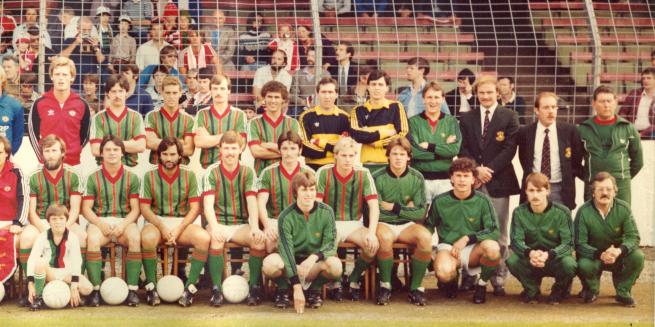
We’re currently running a number of articles here reflecting on great Glentoran players of the recent and not so recent past. But what of the managers? We’ve had our fair share of very diverse characters in charge of football affairs over the past forty years or so but while we get nostalgic about our favourite players, its very easy to forget the men who brought them to the Oval or who led them to their greatest successes or heartbreak. This new series by Ian Clarke will look back on a few of the most notable managers of the recent past and will get the managers’ own viewpoint and memories on their tenure.
THE McFALL YEARS (1979-1984)
Part Two: The Invincibles (1980-1984)
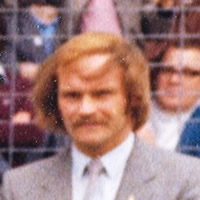
1980/81: After a pretty disappointing and uninspiring end to Ronnie’s first full season, at a time when Glentoran generally weren’t seen as market leaders in a league where Linfield and Glenavon in particular seemed to be sweeping up most of the league’s best players. We went into a close season with little basis for any sort of optimism. How wrong could we be? Personally in 51 years following the Glens I can never remember such an exciting close season (there was no such thing as a transfer window in those far off days). We had lost our captain and hadn’t made a major signing since Gary Blackledge about eighteen months before. Most of the close season was as quiet as we anticipated, until the start of August when all of a sudden we started to see the Ronnie McFall the league then watched for the nest 25 years as we plundered club after club for their best player. Let Ronnie McFall take up the story:
“We all knew the club was falling further away from Linfield and that was hurting everyone around Glentoran. We had a very progressive board at the time with men like Johnston Nelson, David Chick and Billy Stephens who made the decision to back the club financially in an effort to get the club challenging again. They supported me very well when I told them who I wanted to go for.
The first signing was to bring Alan Paterson back to the club from Sligo Rovers after leaving the club for Sheffield Wednesday. That one wasn’t too hard to do. We had a good keeper in Dennis Matthews, but Alan was a lot younger and was a Glentoran supporter so when the word got out that he could be available then we had to get him in. That was the right thing to do because he stayed with Glentoran for well after a decade after that and he was a very reliable keeper,
The next one was Jim Cleary. That was the biggest signing I ever made, for football and other reasons. I’d played with him at Portadown when he was a young player. He’d done very well there, and I knew he’d be a great signing for Glentoran. It was the biggest signing of the lot. Not just because he was a great player. But it was a big statement by the club as well. Glentoran had always had a good cross community support and a lot of great players from across the community. But because of the troubles in the seventies that had stopped. I knew if we were going to kick on, we had to get back to Glentoran’s traditional way of doing things. The troubles were still at their height then, but Jim was very keen to come to the club and there was very little resistance to it, then when everyone saw how good he was everyone idolised him. Rightly so because he was a great player for Glentoran from the minute he came in and he broke down any reluctance other players had to coming to Glentoran.
We signed Alan Harrison from Bangor at the same time we got Cleary. He was a great player too. He was strong, had very quick feet, and read the game very well for someone who was only around 20 at the time. He was a very good signing.
Johnny Jameson came in just after the season started. He was doing well at Linfield, but we got word that he was unhappy there. We were lacking pace at the time and we knew Johnny would give us that. He really wanted to come to Glentoran, so he was easy to sign. As well as his pace Johnny had a lot of creativity and was a great crosser of the ball. So, we knew we’d get good service to Blackledge and Manley from both sides of the pitch. That’s how it turned out.
The last one we brought in that season was Terry Kingon from Cliftonville. I’d played with Terry for a few years at Portadown, so I knew his background and that he’d always wanted to play for Glentoran. He was probably a bit past his very best when we signed him, but we were really lacking that aggression, ball winning ability and also the ability to protect the back four. We’d been scoring goals okay, but we were also losing matches in the likes of the Ulster Cup, so we needed the sort of aggression Terry gave us. Once we signed him, I thought we had a good chance.”
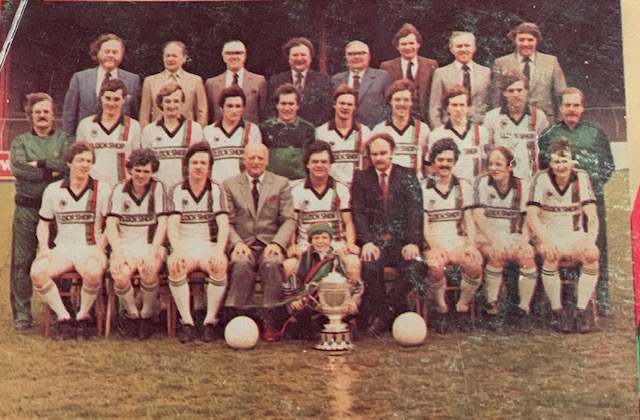
The 1980-81 Invincibles
That was a funny season. Despite the exciting players Ronnie brought in over the summer, we didn’t make a lot of headway in the early season tournaments, the Ulster Cup and Gold Cup. In fact, when we were hammered 4-0 at home by a very good Glenavon team at the end of September in the Ulster Cup at the end of September there was no real sense of optimism about the place. Then in the Gold Cup I can remember the walk back down Cliftonpark Avenue after a miserable Gold Cup defeat at Solitude. But that defeat heralded the start of a six month, twenty three game unbeaten run that took us to the semi final of the Irish Cup (where a couple of very iffy refereeing decisions saw us knocked out by Ballymena United in the semi final replay at Windsor Park).
Incredibly we won the league unbeaten that season with forty goal Gary Blackledge winning a clean sweep of the Northern Ireland Player of the Year awards.
“That was a very different league winning team to the one I played in. Apart from Rab McCreery none of them had won anything with Glentoran, so there was a great hunger throughout the squad. There was also a great collective spirit about a squad of players who had just been brought together that year. Also, although we won the league unbeaten, we still had to go until the very last game of the season and that night we had to beat Crusaders to win the league. That wasn’t a bad Crusaders team with old team mates of mine like Johnny Jamison and Warren Feeney in it. That says how good the Linfield team was that we were up against. But that night I felt confident with the spirit and determination through the squad and they delivered very well.”
1981/82: We started that season the way we finished with a very convincing win of the Ulster Cup for the first time in five years with the team undefeated in the eleven game programme and Blackledge and Cleary in particular on fire with ten and seven goals respectively. Also, we had a very convincing two leg win over Progres Neidercorn In the European Cup, followed by one of pour most heroic European performances, being knocked out in extra time by a freak own goal for CSKA Sofia at the Oval.
But those were the high spots of a very anti-climactic season as we finished four points behind Linfield, despite winning sixteen of our twenty-two league matches and finishing as the league’s top scorers. Also we were knocked out of the Irish Cup at the first attempt at home to Cliftonville, with ex-Linfield keeper Ken Barclay drafted in as emergency cover for the reliable Alan Paterson, injured in our first league defeat, away to Bangor just before Christmas. Paterson was a massive loss over the Christmas period with Ricky Adair (who had packed in football for rugby) called back in an emergency then Barclay helping out, before Ronnie drafted in former Portadown keeper Reggie Hillen as permanent cover.
“That close season I was able to bring in Dermot Keely and Barney Bowers. Keely was very important as Alan Harrison had played most of the previous season without a regular partner at v=centre back. We got away with it and won the league because we scored a lot of goals, but I knew we needed an experienced centre half. I’d seen a fair bit of Keely when he was the captain and backbone of a really strong Dundalk team managed by Jim McLaughlin, He was so good that Billy McNeill wanted him at Celtic but it fell through because Dermot refused to shave off his beard. That’s the sort of person he was’ He was a teacher in Dublin so moving into full time football didn’t really mean a lot to him. But for us he was a great leader and organiser, as well as a very good defender.
Barney Bowers was another great signing for us, from Derby County. He was a great lad who as very skilful, had great awareness of what was going on around him and had a great ability to score goals from midfield. He had a great career at Glentoran.
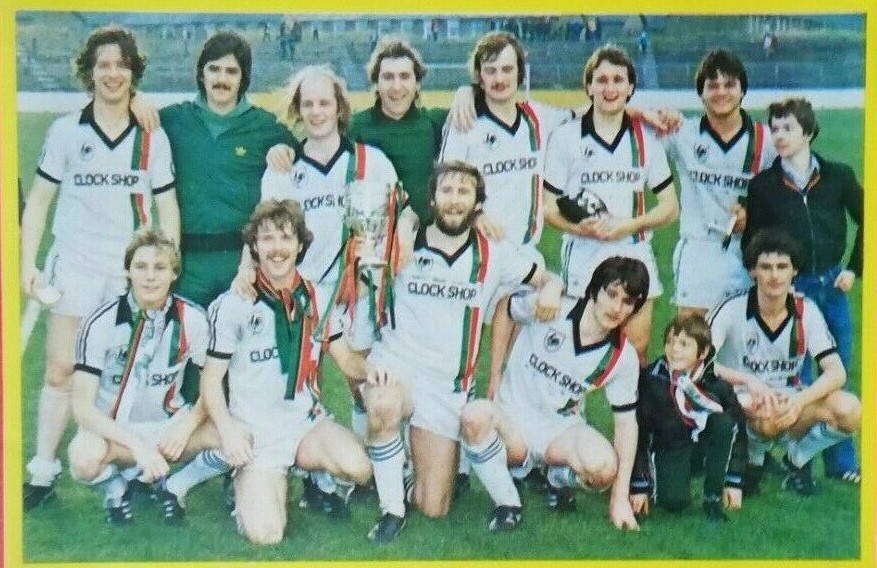
Ulster Cup Winners 1981-82
Sofia was an incredible experience for us that season. We played away in front of seventy or eighty thousand and played really well, despite Robert Strain being sent off late on. But the night will always be remembered for the death of Bobby McGregor. Bobby went on to see if Alan Harrison had concussion, Bobby held his two arms up to signal to us but he collapsed and the next thing we saw was an ambulance going on the pitch to take him to hospital, Bobby was a terrible loss to the club. To me personally it was an awful blow as Bobby brought me to the club when he was manager and I hadn’t known Glentoran without him,
In the home match the players went out with Bobby in everyone’s mind and they played brilliantly. Ron Manly scored a fantastic solo goal and if it wasn’t for a late freak deflected goal we would have gone through. It was one of Glentoran’s great performances, considering Sofia knocked Liverpool out in the next round.
After that we signed Gerry Mullan from Everton. I’d obviously seen Gerry play against us for Ballymena before he went to England and if he was coming home, I was determined to get him and had been in regular touch with Howard Kendall, just in case. It was an expensive deal but Jonty Nelson (Chairman) and I went to Goodison to sign him. Gerry was a great player. He was a very strong lad who workked very hard and also scored a lot of goals, including very important ones. He never let us down.
The other signing came at the end of the season when we signed Tom Connell to replace Robert Strain at left back. We’d agreed to play Manchester United as part of our centenary celebrations and with all the other components of the deal, we agreed terms to bring Connell back. He was from Newry and he’d been a good player for Coleraine before going to United. He’d also had a couple of caps for Northern Ireland. Connell was a good signing for us and also did well for me later at Portadown.”
1982-83: This was the season we won our first Irish Cup for a decade, and the start of a winning run that saw us bring the cup back to East Belfast six times in the next eight years, We again finished second in the league, again as top scorers with Ron Manley leading the way with thirty, leading the line with his old partner Gary Blackledge on loan in France. It was another season we started brilliantly, winning the Ulster Cup with just one defeat in eleven matches, and a Gold Cup Final win over Linfield at the Oval with ex Blues player Johnny Jameson scoring both goals in a 2-0 win
“The Irish Cup win was great, The first match was a 1-1 draw at Windsor where Gerry Mullan scored first for us but to be fair Linfield were very much the better side. For all that we still should have won it that day as Johnny Jameson had a perfectly good late goal disallowed. In the replay we had Barney Bowers out, I can’t remember if he was injured or suspended but either way it was a bad blow for us. We also had Jim Cleary sent off late on but two great goals from Johnny Jameson won it for us. That was a great day, beating Linfield but also it was Glentoran’s first win in a few years.
Irish Cup Winners 1982-83
The other player who came through that season was Raymond Morrison. Raymond was a very underrated player. He was aggressive, very hard working and he had a great ability to make those late runs into the box to score important goals. Raymond had a great career with Glentoran, and I’d say that he, Ron Manley, George Neill and Alfie Stewart were the best young players I brought up from the seconds into the first team.”
1983-84: This season started off well. Blackledge was back from France and the Glens hit the ground running with yet another Ulster Cup win. We got off to a fantastic start with Ron Manley scoring all five in a 5-0 home over Bangor and three more in a 9-2 home win over Larne. Attacking players like Blackledge, Manley, Mullan, Cleary and Jameson (who scored his first har=t trick in a 5-1 home win over Crusaders) all on fire. However the big difficulty, and our eventual undoing over the course of the season, was the loss of our two outstanding centre backs, Dermot Keely back down south to manage UCD in his home city and more controversially the controversial big money loss of lifelong Glenman Alan Harrison to Ballymena United in the Irish League’s first freedom of contract move.
Ronnie McFall: “Losing those two central defenders was a real blow. Keely wasn’t as big a surprise because League of Ireland players tend to move around a bit more. But Harrison’s move came as more of a shock. I think it was the first Irish League freedom of contract move and the tribunal awarded us about £15,000. But where do you replace two players of that quality in the same season. We tried a few players there like Paul Dixon and Harry McCue but really, we didn’t get any sort of settled defence until I was able to bring Terry Moore back from America the next season”.
Ulster Cup winners 1983-84
We finished that season three points behind Linfield, a disappointing outcome, having beaten the Blues 4-1 to go top in March, but then drawing against Ballymena and Ards to let our rivals back in. We looked in a good position to retain the Irish Cup until a shock 2-1 semi-final defeat to Carrick Rangers at Windsor Park. But on a more positive note, the season say very good young players Alfie Stewart and Tommy Leeman (before his move to Rangers) fully establish themselves as first team regulars.
1984-85: In Ronnie’s last few months as manager, we made it to the Gold Cup Final, losing narrowly to Linfield by 1-0 at Windsor Park. We also had two great performances against Standard Liege in the UEFA Cup, losing just 3-1 on aggregate to a very strong Belgian side. The forwards remained potent but defensively we were still weak until Ronnie managed to bring Terry Moore back from Tulsa Roughnecks, along with McFall’s former team mate Billy Caskey. These signings were made just before Christmas but that was too late to save Ronnie McFall’s tenure as manager.
“Terry Moore was the player we needed after Keely and Harrison left us, but it took about eighteen months to get him. Terry had been with me as a midfielder in my first year or so as manager but by the time he came back he was a centre half and a very good one who went on to give Glentoran great service.
I was really pleased to get Billy Caskey back. When he played with me, he was a centre forward but by the time he came back he was back in centre midfield here he’d started at Glentoran as a young player. Caskey was fantastic. The whole time he was in America I tortured him about coming back because as a team mate I knew how he could lift a team. He had everything for that position he played. He came back to us at around thirty and played for another eight or nine years at the same level of performance, never letting it drop”.
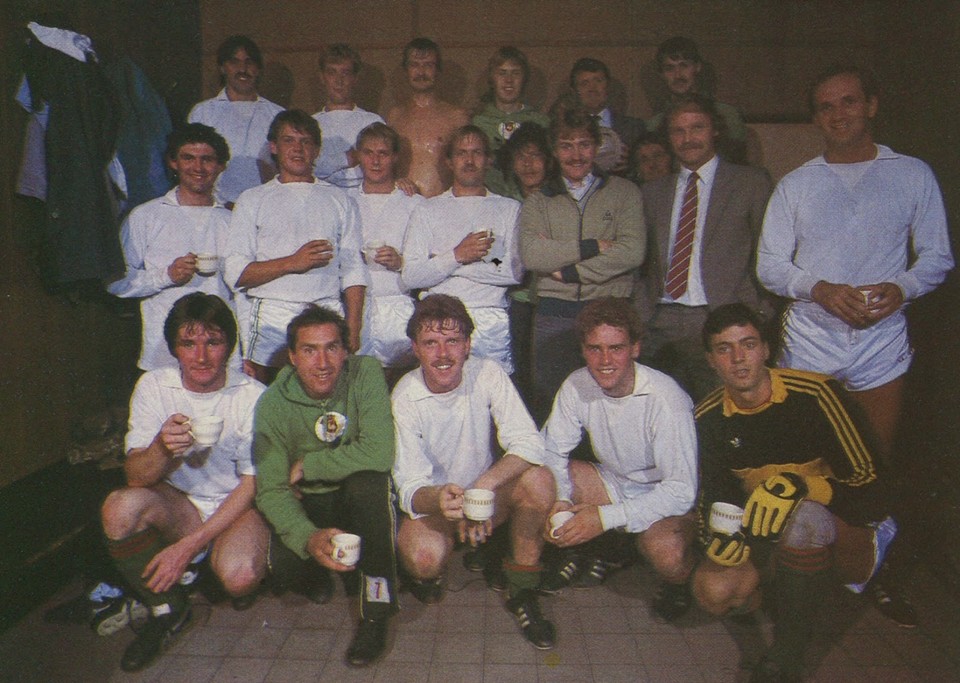
Ronnie McFall left Glentoran on Boxing Day 1984, just short of six years as manager, after a 2-0 win over Distillery at Ballyskeagh. It seems his fate was sealed after a 3-2 defeat at home to Cliftonville for days earlier. During his tenure, the Glens had won six trophies, no mean feat considering the rebuilding job he had inherited. However most Glentoran supporters of that era would claim Ronnie’s legacy was the retinue of top p=layers he brought to the club and who had a great decade’s success under other managers – Cleary, Neill Blackledge, Manley Mullan, Bowers, Neill, Paterson, Morrison and Moore to name but a few.
For me, the first McFall era was a great time to be a Glenman. With the passage of time it becomes even moreso.




